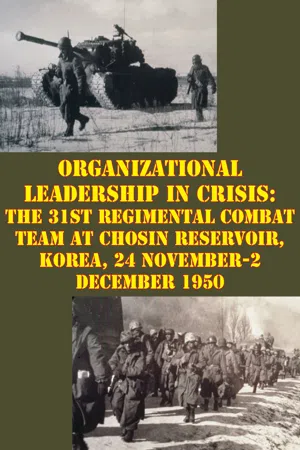
eBook - ePub
Organizational Leadership In Crisis:
The 31st Regimental Combat Team At Chosin Reservoir, Korea, 24 November-2 December 1950
- 70 pages
- English
- ePUB (mobile friendly)
- Available on iOS & Android
eBook - ePub
Organizational Leadership In Crisis:
The 31st Regimental Combat Team At Chosin Reservoir, Korea, 24 November-2 December 1950
About this book
The 31st Regimental Combat Team (RCT) was created on 24 November 1950. On 27 November it had the mission of relieving the Marines of the 1st Marine Division East of the Chosin reservoir and attacking to the North towards the Yalu River. The unit's battalions and separate companies were spread out along the road from the port of Hungnam in the south to forward positions east of the reservoir over 90 miles away when it was hit by the surprise attack of the Chinese 80th Peoples' Liberation Army (PLA) Division on the evening of 27 November. Organizational leadership failures at the level of the X Corps, 7th Infantry Division, the 31st RCT and its attached battalions all contributed to the almost complete destruction of the RCT by the evening of 1-2 December 1950. These failures led to a very poor situational awareness prior to the Chinese attack and helped create the total breakdown of organizational cohesion and effectiveness that occurred during the unit's ill-fated attempt to breakout of the Chinese encirclement. This thesis shows how decisions that are made at the organizational level are critical to the success of the unit.
Frequently asked questions
Yes, you can cancel anytime from the Subscription tab in your account settings on the Perlego website. Your subscription will stay active until the end of your current billing period. Learn how to cancel your subscription.
No, books cannot be downloaded as external files, such as PDFs, for use outside of Perlego. However, you can download books within the Perlego app for offline reading on mobile or tablet. Learn more here.
Perlego offers two plans: Essential and Complete
- Essential is ideal for learners and professionals who enjoy exploring a wide range of subjects. Access the Essential Library with 800,000+ trusted titles and best-sellers across business, personal growth, and the humanities. Includes unlimited reading time and Standard Read Aloud voice.
- Complete: Perfect for advanced learners and researchers needing full, unrestricted access. Unlock 1.4M+ books across hundreds of subjects, including academic and specialized titles. The Complete Plan also includes advanced features like Premium Read Aloud and Research Assistant.
We are an online textbook subscription service, where you can get access to an entire online library for less than the price of a single book per month. With over 1 million books across 1000+ topics, we’ve got you covered! Learn more here.
Look out for the read-aloud symbol on your next book to see if you can listen to it. The read-aloud tool reads text aloud for you, highlighting the text as it is being read. You can pause it, speed it up and slow it down. Learn more here.
Yes! You can use the Perlego app on both iOS or Android devices to read anytime, anywhere — even offline. Perfect for commutes or when you’re on the go.
Please note we cannot support devices running on iOS 13 and Android 7 or earlier. Learn more about using the app.
Please note we cannot support devices running on iOS 13 and Android 7 or earlier. Learn more about using the app.
Yes, you can access Organizational Leadership In Crisis: by Paul T. Berquist in PDF and/or ePUB format, as well as other popular books in Histoire & Histoire de l'Asie centrale. We have over one million books available in our catalogue for you to explore.
Information
Topic
HistoireSubtopic
Histoire de l'Asie centraleTable of contents
- Title page
- TABLE OF CONTENTS
- ABSTRACT
- ACRONYMS
- CHAPTER 1 - INTRODUCTION
- CHAPTER 2 - BACKGROUND OF THE UNIT AND LEADERS
- CHAPTER 3 - LEADERSHIP & INTELLIGENCE, OCTOBER-NOVEMBER 1950
- CHAPTER 4 - MOVING INTO THE TRAP, CHINESE ATTACK 27-29 NOVEMBER 1950
- CHAPTER 5 - BREAKOUT, 29 NOVEMBER-2 DECEMBER 1950
- CHAPTER 6 - CONCLUSION
- BIBLIOGRAPHY